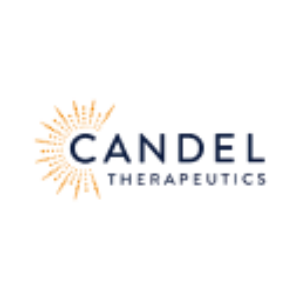CAN-3110 Receives FDA Fast Track Designation for Treatment of Recurrent High-Grade Glioma
NEEDHAM, Mass., Feb. 13, 2024 (GLOBE NEWSWIRE) -- Candel Therapeutics, Inc. (Candel or the Company) (Nasdaq: CADL), a clinical stage biopharmaceutical company focused on developing multimodal biological immunotherapies to help patients fight cancer, today announced that the U.S. Food and Drug Administration (FDA) granted Fast Track Designation for CAN-3110 -- a first-in-class, replication-competent herpes simplex virus-1 (HSV-1) oncolytic viral immunotherapy candidate – for the treatment of patients with recurrent high-grade glioma (HGG) to improve overall survival.
“Receiving FDA Fast Track Designation for CAN-3110 reinforces the critical need to find effective treatment options for patients with recurrent HGG and further supports the potential of CAN-3110 to address the challenges that the standard of care and conventional therapies have failed to meet,” said Paul Peter Tak, MD, PhD, FMedSci, President and CEO of Candel. “As recently published in Nature, a strong local and systemic anti-tumoral response and improved survival in patients with recurrent HGG was observed following a single injection of CAN-3110. We look forward to reporting additional data, including the potential benefits from multiple injections of CAN-3110, from the ongoing phase 1b clinical trial in the second half of 2024.”
In October 2023, Candel and academic collaborators at the Brigham and Women’s Hospital published results from the ongoing phase 1b clinical trial in Nature, demonstrating that CAN-3110 was well tolerated with no dose-limiting toxicity reported. The investigators observed a nearly doubling of the expected median overall survival (mOS) after a single CAN-3110 injection, achieving a mOS of ~12 months, compared to historical reports of less than 6 to 9 months in this therapy-resistant condition. Positive HSV-1 serology was a predictor of response and was associated with improved survival (mOS in this population reached 14 months). Increased infiltrating immune cells in the tumor microenvironment and expansion of the T cell repertoire after administration were also associated with improved survival, suggesting that CAN-3110 can elicit both a local and systemic antitumoral response.
“Recurrent HGG is one of the most aggressive malignancies for which there is no cure, representing a significant and urgent unmet need,” said Antonio Chiocca, MD, PhD, Head of Department of Neurosurgery at Brigham and Women’s Hospital, Professor at Harvard Medical School, and Principal Investigator. “With Fast Track Designation, I look forward to the potential of accelerating the development of CAN-3110 and the possibility of bringing this differentiated therapy to patients with recurrent high-grade glioma as we strive to improve outcomes and provide hope for patients and their families.”
About CAN-3110
CAN-3110 is a first-in-class, replication-competent herpes simplex virus-1 (HSV-1) oncolytic viral immunotherapy candidate designed with dual activity for oncolysis and immune activation in a single therapeutic. Its activity is designed to be conditional to the expression of Nestin in cancer cells. CAN-3110 is being evaluated in a phase 1 investigator-sponsored clinical trial in patients with recurrent HGG. In October 2023, the Company announced that Nature published results from this ongoing clinical trial. CAN-3110 was well tolerated with no dose-limiting toxicity reported and CAN-3110 plus prodrug was associated with improved survival. Positive HSV-1 serology was a predictor of response and was associated with improved survival. Increased infiltrating immune cells in the tumor microenvironment and expansion of the T cell repertoire after treatment were also associated with improved survival. In the clinical trial, the investigators observed a nearly doubling of the expected median overall survival after a single CAN-3110 injection, compared to historical reports of less than 6 to 9 months in this therapy-resistant condition. By comparison, survival in the anti-HSV-1 positive patients who received CAN-3110 was more than 14 months. The Company and academic collaborators are currently evaluating the effects of multiple CAN-3110 injections in recurrent HGG, supported by the Break Through Cancer Foundation, and expect initial results in the second half of 2024.
Candel expects to initiate IND-enabling work in a second indication characterized by Nestin expression.
About the phase 1 clinical trial of CAN-3110 in recurrent HGG
This investigator-sponsored study is led by E. Antonio Chiocca, MD, PhD, Head of the Department of Neurosurgery at Brigham & Women’s Hospital and Professor at Harvard Medical School. The clinical trial comprises three arms. In arm A, 41 patients with recurrent HGG received a single intratumoral injection of CAN-3110 (dose ranging from 1x106 plaque forming units (pfu) to 1x1010 pfu), including nine patients with multifocal/multicentric, deep or bilateral tumors associated with poor survival. After observing this regimen was generally well tolerated without dose-limiting toxicity, patients in arm B (n=9) received a single dose of cyclophosphamide (24 mg/kg), two days before CAN-3110 injection at doses of 1 x 108 pfu (n=3) and 1 x 109 pfu (n=6). The rationale is based on findings in mouse models, where cyclophosphamide improved viral persistence in injected tumors. In arm C, supported by the Break Through Cancer foundation, two cohorts of 12 patients with recurrent HGG will receive up to six injections of CAN-3110 over a four-month period.
About Fast Track Designation
Fast Track Designation is an FDA program designed to facilitate the development and expedite the review of medicines with the potential to treat serious conditions and fulfill an unmet medical need. An investigational medicine that receives Fast Track Designation may be eligible for more frequent interactions with the FDA to discuss the candidate’s development plan and, if relevant criteria are met, may be eligible for priority review.
About Candel Therapeutics
Candel is a clinical stage biopharmaceutical company focused on developing off-the-shelf multimodal biological immunotherapies that elicit an individualized, systemic anti-tumor immune response to help patients fight cancer. Candel has established two clinical stage multimodal biological immunotherapy platforms based on novel, genetically modified adenovirus and herpes simplex virus (HSV) gene constructs, respectively. CAN-2409 is the lead product candidate from the adenovirus platform and is currently in ongoing clinical trials in non-small cell lung cancer (NSCLC) (phase 2), borderline resectable pancreatic cancer (phase 2), and localized, non-metastatic prostate cancer (phase 2 and phase 3). CAN-3110 is the lead product candidate from the HSV platform and is currently in an ongoing investigator-sponsored phase 1 clinical trial in recurrent high-grade glioma (HGG). Finally, Candel’s enLIGHTEN™ Discovery Platform is a systematic, iterative HSV-based discovery platform leveraging human biology and advanced analytics to create new viral immunotherapies for solid tumors.
For more information about Candel, visit: www.candeltx.com
Forward-Looking Statements
This press release includes certain disclosures that contain “forward-looking statements” within the meaning of the Private Securities Litigation Reform Act of 1995, as amended, including, without limitation, express or implied statements regarding the timing and advancement of development programs, including the timing and availability of additional data, key data readout milestones, including CAN-3110 in HGG; expectations regarding the potential benefits conferred by Fast Track Designation; expectations regarding the therapeutic benefit of its programs, including the potential for its programs to extend patient survival; and expectations regarding cash runway and expenditures. The words “may,” “will,” “could,” “would,” “should,” “expect,” “plan,” “anticipate,” “intend,” “believe,” “estimate,” “predict,” “project,” “potential,” “continue,” “target” and similar expressions are intended to identify forward-looking statements, although not all forward-looking statements contain these identifying words. Any forward-looking statements in this press release are based on management’s current expectations and beliefs and are subject to a number of risks, uncertainties and important factors that may cause actual events or results to differ materially from those expressed or implied by any forward-looking statements contained in this press release, including, without limitation, those risks and uncertainties related to the timing and advancement of development programs; expectations regarding the therapeutic benefit of the Company’s programs; that final data from our pre-clinical studies and completed clinical trials may differ materially from reported interim data from ongoing studies and trials; the Company’s ability to efficiently discover and develop product candidates; the Company’s ability to obtain and maintain regulatory approval of product candidates; the Company’s ability to maintain its intellectual property; the implementation of the Company’s business model, and strategic plans for the Company’s business and product candidates, and other risks identified in the Company’s SEC filings, including the Company’s most recent Quarterly Report on Form 10-Q filed with the SEC, and subsequent filings with the SEC. The Company cautions you not to place undue reliance on any forward-looking statements, which speak only as of the date they are made. The Company disclaims any obligation to publicly update or revise any such statements to reflect any change in expectations or in events, conditions or circumstances on which any such statements may be based, or that may affect the likelihood that actual results will differ from those set forth in the forward-looking statements. Any forward-looking statements contained in this press release represent the Company’s views only as of the date hereof and should not be relied upon as representing its views as of any subsequent date.
Media Contact
Aljanae Reynolds
Director
Wheelhouse Life Science Advisors
areynolds@wheelhouselsa.com
Investor Contact
Sylvia Wheeler
Principal
Wheelhouse Life Science Advisors
swheeler@wheelhouselsa.com








